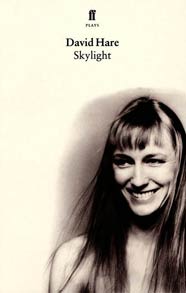Books |
Skylight
David Hare
By
Published: Jul 16, 2014
Category:
Drama
If Head Butler had a book group, we’d all be reading “Skylight” this month.
Well, there can’t be a book club — that would require message boards, and message boards invariably attract trolls, and I’ve been there before, so… no thanks.
Well, maybe there could be — you read the play, you write me about it, I cull your responses and publish the best.
I’m up for that, if you are.
First, I have to convince you that you should push everything else off your night table and read a 96-page play that won David Hare a shelf of awards in 1995.
No, first I have to convince you that what scorched London and New York two decades ago is relevant in 2014.
Start here. A new production is scorching London — I’ve never seen Ben Brantley, in The New York Times, serve up praise quite like this. The play may come to New York with the London cast (Bill Nighy and Carey Mulligan). And, oh, it’s been filmed for broadcast in movie theaters in Great Britain (July 17) and other countries (October 23).
Yeah, it’s that good. [To buy the paperback from Amazon, click here. For the Kindle edition, click here.]
You know Carey Mulligan because she was in “The Great Gatsby” and “Inside Llewyn Davis” and was nominated for an Academy Award for “An Education.” You know the lanky, floppy-haired Bill Nighy from many movies (“Love, Actually”) and State of Play, the BBC TV series I have urged you repeatedly to see. As for David Hare, he’s a king of the English theater; he wrote “Plenty, “Pravda,” “The Blue Room” and Stuff Happens, and won Academy Award nominations for the screenplays of “The Reader” and “The Hours.”
Enough with credentials — what’s “Skylight” about?
Two people. In one room. For one night.
Shades of Samuel Beckett? More like George Bernard Shaw.
Tom Sergeant owns restaurants. He started small. He grew big — in his 50s, he’s rich. And, to his annoyance, he’s the pawn of the bankers who made him rich but loathe innovation and risk.
Kyra Hollis, who’s around 30, once worked for Tom. And more: she lived in his home. And more: she was close to Alice, his wife. And more: for six years, she and Tom had a secret affair. Alice found out. Kyra left that day. Now she lives in a dump and teaches poor kids at a school in a rough neighborhood.
Tom and Kyra haven’t seen one another for three years. Why does he show up now? Because Alice got cancer and, three years ago, died. Because he has no anchor. Because — but you know this — he wants Kyra to live with him.
Key fact: Margaret Thatcher left office in 1990. “Skylight” opened in 1995. Hare was no fan of Thatcher’s brand of conservative politics (think: Ronald Reagan). But — and this is also key — Tom is not a mouthpiece for Thatcherism. He’s a man in pieces, eager to reconnect with a woman who understands him, aggravated that she has changed for reasons he doesn’t understand at all.
The play is their conversation — really, their debate. And it’s not easy to score it. Is Tom a bully? Is Kyra’s idealism too good to be true? What is the obligation of the rich to the poor? Who are we to one another?
Some of the debate is political. (Kyra, on teaching the poor: “What does it matter why I do it? Why anyone goes out and helps? The reason is hardly of primary importance. If I didn’t do it, it wouldn’t get done.”) But more of it is personal, ranging from the inferiority of the cheese she now uses in her pasta to the morality of affairs that start in secret and remain that way.
“We know which side of the divide Mr. Hare comes down on,” Ben Brantley writes. “But it is to his credit, and to that of this nigh perfect production, that as long as we’re watching ‘Skylight,’ our sympathies are always torturously in flux. Be ready to cry. The thinking can happen later.”
96 pages. On your mark, get set, go. And later, if you are so inclined, let me know.


